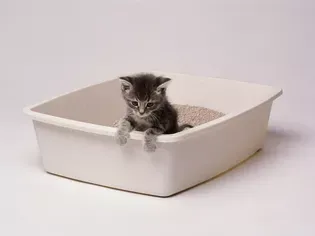Kitten Diarrhea: When to See the Vet
Updated on 05/27/24

Kitten Diarrhea: When to Rush Your Furry Friend to the Vet
As a kitten parent, witnessing your little bundle of joy suffer from diarrhea can be a heart-wrenching experience. Diarrhea, the frequent passage of loose or watery stools, is not only uncomfortable for kittens but can also lead to life-threatening complications. Knowing when to consult a veterinarian is crucial for ensuring the health and well-being of your feline companion.
Causes of Diarrhea in Kittens
Diarrhea in kittens can stem from various underlying causes, including:
* Infectious agents: Bacteria (e.g., Salmonella, Campylobacter), viruses (e.g., feline panleukopenia virus, feline coronavirus), and parasites (e.g., coccidia, Giardia)
* Dietary indiscretion: Sudden changes in diet, consumption of spoiled food, or ingestion of foreign bodies
* Stress: Environmental changes, such as moving or introducing new pets, can trigger emotional distress and gastrointestinal upset
* Allergies: Food allergies or sensitivities can cause inflammation and diarrhea
* Gastrointestinal diseases: Conditions like inflammatory bowel disease or pancreatitis can lead to chronic diarrhea
When to Seek Veterinary Attention
While some cases of diarrhea in kittens can resolve on their own, it's essential to know when to seek veterinary care. The following signs warrant immediate attention:
* Severe or persistent diarrhea: Diarrhea that lasts more than 24 hours or is accompanied by other symptoms, such as vomiting, lethargy, or loss of appetite
* Blood or mucus in the stool: The presence of blood or mucus indicates gastrointestinal inflammation or infection that requires medical attention
* Dehydration: Kittens can quickly become dehydrated due to diarrhea. Signs of dehydration include sunken eyes, dry gums, and lethargy
* Fever: A rectal temperature above 103°F (39.4°C) suggests infection or underlying medical conditions
* Kitten is less than 8 weeks old: Young kittens are more vulnerable to dehydration and complications from diarrhea
Home Care for Mild Diarrhea
For mild cases of diarrhea that do not require immediate veterinary attention, the following home care measures can help:
* Withhold food for 12 hours: Restricting food allows the gastrointestinal tract to rest and recover
* Offer plenty of fluids: Encourage your kitten to drink plenty of water, Pedialyte, or low-sodium chicken broth to prevent dehydration
* Provide a bland diet: After the 12-hour fast, introduce a bland, easily digestible diet, such as boiled chicken and rice or prescription gastrointestinal food
* Monitor your kitten's condition: Keep an eye on your kitten's symptoms and seek veterinary care if they worsen or do not improve within 24 hours
Prevention of Kitten Diarrhea
Proactive measures can help reduce the risk of diarrhea in kittens:
* Vaccinations: Vaccinations protect kittens against common infectious causes of diarrhea, such as feline panleukopenia virus and feline coronavirus
* Proper hygiene: Maintain a clean environment, wash food and water bowls daily, and dispose of pet waste promptly
* Avoid dietary indiscretion: Feed your kitten high-quality kitten food and avoid sudden changes in diet
* Introduce new foods gradually: If you decide to change your kitten's food, do so gradually over several days to minimize the risk of stomach upset
* Manage stress: Provide a calm and comfortable environment for your kitten and minimize potential stressors
Conclusion
Kitten diarrhea can be a common but potentially serious issue. By recognizing the causes and symptoms of diarrhea, you can make informed decisions about when to seek veterinary care and provide appropriate home care for mild cases. Remember, early intervention is key to ensure the health and well-being of your furry friend.
Explore More Pets

Cat Behavior Problems
How to Stop Aggression in Kittens

Long-Haired Cat Breeds
Siberian Cat: Breed Profile, Characteristics, & Care

Cat Behavior Problems
How to Stop Kittens From Scratching and Biting

Long-Haired Cat Breeds
Turkish Angora: Cat Breed Profile, Characteristics & Care

Basic Training
How to Socialize Your Kitten

Short-Haired Cat Breeds
Cute Pictures & Facts About Calico Cats & Kittens

Litter Box Training
Training Your Kitten to Use the Litter Box

Long-Haired Cat Breeds
10 Fun Facts About White Cats
